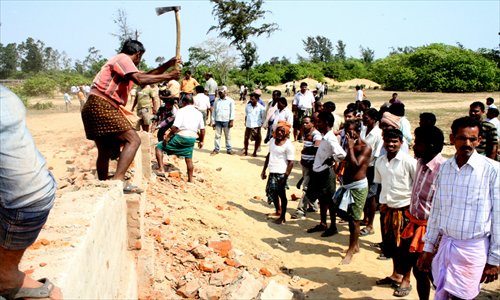HOME >> WORLD
Posco steeled for trouble
By Basudev Mahapatra in Odisha Source:Global Times Published: 2014-3-4 0:38:01

Agitated land losers raze the boundary wall at Posco project site in Nuagaon, Odisha on February 16. Photo: Basudev Mahapatra
Posco's proposed steel plant near Paradip in Odisha, India, seems to be plagued by conflict.
Recently, the supporters of the project have taken up to agitation against Posco alleging non-fulfillment of promises made by the company and the local administration. While the movement opposing the project has delayed its execution, this fresh agitation by supporters has become another problem for Posco and the Odisha government.
Angry over the callousness of district administration and the Posco authorities toward their long pending demands, over 1,000 pro-Posco villagers from Nuagaon destroyed a 300-meter boundary wall in the project area on February 16. They also set the temporary camp offices of Posco and IDCO, the state agency to facilitate industrial development, on fire. Most of the agitating villagers were land losers who have handed over their land for Posco's proposed steel plant.
"We gave our land for the Posco project believing the government that promised proper rehabilitation packages and employment to at least one member from each family. It's more than five years since many families have lost their land to Posco. The Posco project is being delayed for many reasons and we people who have sacrificed our land and livelihood sources are only suffering," said Tamil Pradhan of Nuagaon, who is a land loser and leader of pro-Posco villagers.
"We have all decided now that we are not going to allow the company to enter the area and start its construction work till our demands are fulfilled," Tamil added.
Demands unmet
The six point charter of demands put before the Rehabilitation and Peripheral Development and Advisory Committee (RPDAC) meeting of 2010 included assured employment to each land-losing family; separate and enhanced prices for homes, homesteads and agricultural land; monthly allowance for landless laborers engaged in agriculture and betel vines; and project construction works to be done by local people through engaging members of local communities.
"None of the demands are fulfilled. Even though they promised to give unemployment allowance to the youth of land-losing families, they haven't listed anybody," said Prabhat Pradhan of Nuagaon.
The company and the local administration made promise after promise in order to acquire land for the project. The government, through the district administration and its industrial development agency, IDCO, has acquired 2,700 acres of land required for Posco's 8 mpta (million tons per annum) plant. Everybody expected that Posco would fulfill all its promises made to people after the land acquisition. But people's demands have never been met.
Broken promises
Apart from the apathetic attitude of district administration and Posco authorities, these land losers have been victims of the multi-core chit-fund scam that took place in Odisha.
"As people received their compensation money, this place became heaven for agents of chit-fund companies like Artha Tatwa (AT) and Seashore. With promises of lucrative growth they have taken away all compensation money from almost 90 percent of land losers. People were just allured by absurd promises made by chit-fund companies. Now the scam is uncovered and these people have little hope of getting back their investment money. Their distress is doubled," Prabhat added.
So the first benefit of industrialization has been looted away by the chit-fund companies that allegedly operated in close connivance with the political leadership of Odisha.
It's because of all these reasons that discontent is simmering. In January, a group of supporters sat in protest at Gadakujanga for more than 20 days. Nobody responded. On February 16, pro-Posco villagers in Nuagaon showed their anger by destroying the boundary wall and setting offices on fire. The villagers have now erected bamboo barricades at village entry points to stop the Posco people and government officials from entering the villages and the project area. Now their one point demand is "Fulfill the promises before doing any construction."
Misleading the people
In January, a senior BJD (Biju Janata Dal) leader and the health minister of Odisha Dr Damodar Rout made open allegations against the company and the district administration saying, "A group of Posco's Indian employees and Jagatsinghpur district administration are misleading the people living in the proposed plant site villages."
He also alleged "the people are not being given compensation as per the decision of the RPDAC. While some people get maximum benefit, others do not get the same."
A senior leader of the ruling party BJD and minister in Naveen Patnaik's cabinet making such allegations carries huge importance.
Now, it's not only the members of PPSS (Posco Pratirodh Sangram Samiti) who are opposing Posco's proposed steel project. The so called supporters are emerging as a bigger trouble.
"We have been opposing the project from the beginning because we know it's a design to grab the land and loot our resources. Now the supporters of the project have also realized that the single agenda of Posco is to acquire their fertile agricultural land and construct a boundary wall. They have started opposing the project now," said Prasanta Paikray, spokesperson of anti-Posco outfit PPSS.
Recent developments have only added to Posco's woes. Once the troubles at the site are over, the biggest hurdle will be mining at Khandadhar. Even though it managed to overcome the legal battle over a Khandadhar mining lease, who knows if Posco won't struggle with tribal groups like Vedanta Aluminium in Niyamgiri.
Posco may be right worry. Khandadhar is inhabited by Paudi Bhuyans, a primitive tribal group, whose land rights are protected in the Indian constitution.
It seems the war for steel is not yet over.
Posted in: Asia in Focus